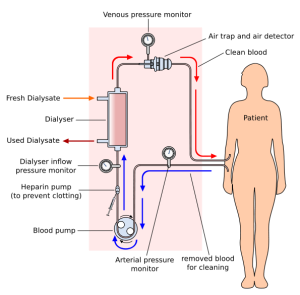Dialysis Dietitians & Renal Diets
 There's a reason I'm not a nurse or a doctor. And that reason is blood.
There's a reason I'm not a nurse or a doctor. And that reason is blood.
My name is Carlene and my last run in with dialysis left me passed out in the hospital hallway. Yes, that person they show in the movies that keels over when there's blood? That's me. So when I found out I had an entire week rotation at a Davita dialysis center, I freaked.
I'm here to tell you my time at Davita was my favorite rotation so far. Surprised? I was too, but that's what this internship is for: to show you that something uncomfortable can be the best experience. My preceptor was an amazing outpatient dietitian who understood that not everyone has to be a clinical RD (that's another post for another day). She found multiple ways for me to learn and have an outstanding experience, without making me pass out. In fact, she made such a great impression that if I didn't have the blood issue, I would totally be a Davita RD. I loved seeing the same patients throughout the week, the logical lab values and diet therapy, the relaxed setting...I think I'm going to shed a tear I miss it so much.
Renal Dietetics 101
-Dialysis is all about using a 'mechanical kidney' to take out toxins and fluid. Using diffusion, molecules will shift based on their concentration from blood to dialysate or reverse to 'even it out'.
-There are several types of dialysis (hemo, peritoneal, home, and nocturnal) which vary in frequency and length. Hemo patients come in usually 3 times a week, so you get to know the person!
-The renal RD works with patients weekly to review labs and help them make changes in diet and supplements. She's part pharmacist. She helps patients decide what kind of binders to take and what strength vitamin D they need (physiologically, renal pts need active vitamin D to alter a chemical pathway).
-Phosphate binders are a must at every meal. The average dialysis patient takes 21 pills a day. The RD uses a visual of a magnet (phosphate binder) in a bag of paper clips (phosphate). The more phosphate you eat, the more binders you need to take. If you don't have enough magnets in the bag, you can't catch all the paper clips which means too much phosphate in the blood.
-Be realistic about diet. The renal diet means you need to watch things like phosphorus, calcium, and potassium levels. Dairy is high in phosphorus. Just try to tell someone whose favorite food is mac and cheese they can never have it again. Compliant? I think not. My favorite thing is how realistic she was. She said she would never tell a patient they couldn't have their favorite food. Instead, she would teach them how they could have it (how often and with how many binders).
To wrap up my week at Davita (sniffle-sniffle), I helped at a facility cook out for patients! We grilled burgers in the parking lot but patients couldn't have cheese or tomatoes (phosphorus and potassium). And of course, we supplied extra phosLo and other binders-remember they are a must at every meal!
Next up: nutrition support and tube feeding galore,


